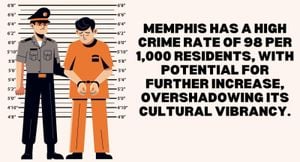Saudi Arabia's ambitious vision of creating Neom, often heralded as the future of modern living, is now facing significant challenges, raising questions about its viability and fiscal sustainability. This multi-faceted project, which aims to build futuristic cities replete with cutting-edge technologies and sustainable living practices, has long been associated with hopes of diversifying the economy away from oil dependency. Yet, as costs spiral upwards and operational timelines falter, the enormity of the task has become increasingly apparent.
The recent leadership shake-up has added to the uncertainties surrounding Neom. Nadhmi Al-Nasr, who had been the project’s chief executive since its inception, stepped down amid allegations of misconduct. Such news has not only sent ripples through the ranks of Neom's workforce but has also prompted concerns over the project’s direction. His successors, including the newly appointed acting CEO Aiman Al-Mudaifer, previously linked to the Public Investment Fund (PIF), now find themselves at the helm of this colossal endeavor.
Neom's scope is as grand as its ambitions; it encompasses vast areas, including Trojena, Oxagon, and The Line, with plans extending over more than ten major projects. Trojena is particularly interesting, as it is poised to become Saudi Arabia’s first winter sports destination, with prospects of launching luxury residential properties soon. According to Simon Howard, Trojena’s head of sales, the project will begin offering apartments as part of its first product launch early next year. The expectations are high with over 700 private units slated for release, aimed at affluent Saudis seeking second homes.
Yet funding issues loom large. Despite the Saudi government’s stable financial reputation, the viability of Neom as one of its flagship projects has come under scrutiny. Initial cost projections were estimated at around $500 billion but now appear close to $2 trillion, far exceeding the capabilities of the PIF. This discrepancy has ignited conversation over whether the kingdom can allocate sufficient resources to sustain all its ambitious projects following the unexpected hosting rights awarded to Riyadh for the World Expo 2030.
While high-profile aspirations abound, realities on the ground paint a stark picture. Reports of construction delays and mistreatment of workers have surfaced, casting shadows on the project's humanitarian and ethical commitments. Just recently, it was revealed through various media outlets, including ITV, about the uncomfortable truth surrounding worker fatalities linked to Vision 2030 projects, which has remained fiercely denied by Saudi officials as mere ‘misinformation’.
Financial aspects are equally troublesome. The demand for funds from external sources has increased as global oil prices fluctuated, compounded by dwindling foreign investment interest. Despite Neom officials communicating their strategies to attract private sector investment—raising $24 billion to date—there's persistent skepticism about whether this is enough. The recent shift of focus to develop projects within Riyadh also indicates changing priorities at governmental levels, hinting at possible reallocations of finances.
The challenges are not limited to financial or ethical dimensions. The operational transparency of the Neom initiative has also been questioned. Non-disclosure agreements cloud the progress of multiple undertakings, leaving stakeholders and observers alike wanting for more detailed updates. Al-Mudaifer’s appointment has prompted some optimism about revitalization, but many are still waiting for the promised transparency surrounding the project's initial aspirations.
Despite the swirling uncertainties, major infrastructure firms continue to engage with Neom. Enterprises such as Mott MacDonald and Jacobs remain committed to collaborating on various elements, including the city’s utility systems and overall urban design. These firms contribute immensely to maintaining architectural integrity and employing sustainable practices. The approach aligns with Saudi Arabia’s broader Vision 2030 framework — which aims for economic diversification, sustainability, and reducing dependence on oil.
Neom, especially with its flagship projects like The Line and Oxagon poised to redefine urban living, seeks to showcase Saudi Arabia’s commitment to innovation. Envisioned as linear cities powered by renewable energy and adopting advanced smart technologies, the real challenge lies not only in realizing these plans but also ensuring the social and economic foundations on which they stand are equally sound.
For now, as Saudi Arabia navigates its way through leadership changes and project uncertainties, the world watches closely. Amidst the visual allure of futuristic city designs, the underlying dynamics of governance, funding, and public perception will play pivotal roles. How the government chooses to adapt their strategies and commitments to meet both the local population's expectations and international scrutiny remains to be seen.
While Neom remains integral to carving out the kingdom's future away from traditional oil economies, successful execution will require more than just visionary designs. It will need to address financial accountability, ethical treatment of workers, and above all, transparent communication with the global community. The road ahead is fraught with challenges, but for those who dare to dream big, the potential rewards could alter the socio-economic framework of the entire region.



